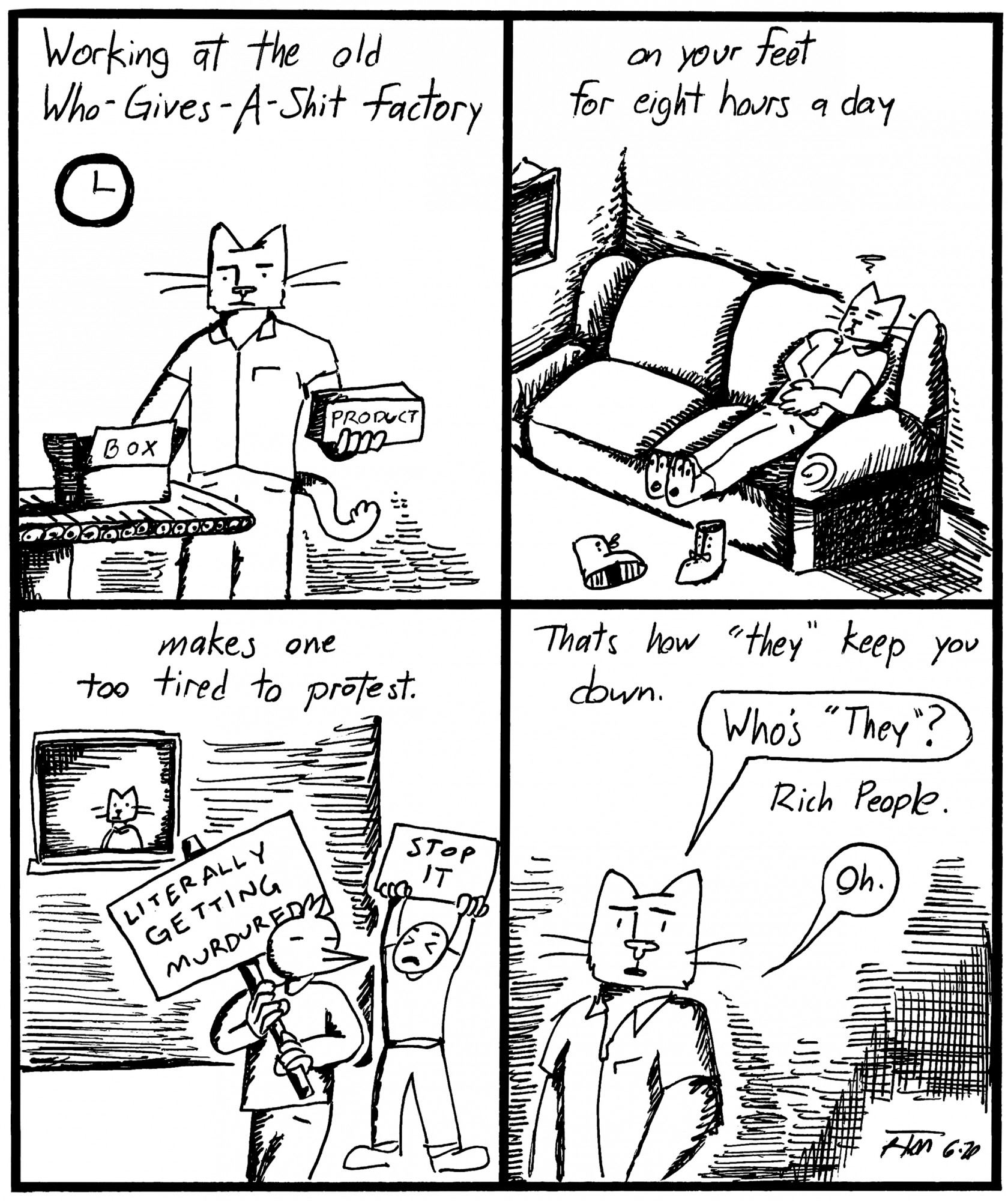Police in the U.S. must change from the way they are today, but without hawkish vigilance, we risk leaving the door open to something that can be much worse: large-scale privatized policing.
If any state or national legislative body makes it so far as to comply with popular demands and restructure the police, they will take their time to examine alternatives to current institutions and power divisions. Legislatures will receive proposals theoretically of myriad thought-out, thorough, self-sustaining replacements that do not repeat or further entrench white supremacy in law enforcement. But they will also receive proposals that do further exploitation because opportunists know a power vacuum when they see one.
In every perestroika there are opportunists. For example, in localities that newly legalize weed, which has been a vehicle for scapegoating Black men since Nixon started the War on Drugs, growing and vending permits are overwhelmingly granted to white people instead of Black, despite the abundance of Black businesspeople. In a changing economy, business models must adapt and change, not least to begin with print media, but newspapers across the country are being absorbed and raked over by Sam Zell and other private-equity executors. As a result, to make them more profitable, the new private-equity owners are laying off reporters en masse, which stops newspapers from serving their purpose fully. (In fact, deconstructive opportunism is the primary motivator for virtually everything private equity gets involved in, which is a lot.) For a very small-scale example, there was probably a well-off suburbanite or two at the demonstrations in the early days after the police killing of George Floyd who was there to loot some sunglasses more than protest for racial justice in policing. And for another large one, after the Soviet Union vacated Afghanistan in 1989, al Qaeda was born out of resentment that had been percolating from the previous decade of Soviet material support to the Afghan communist government. Over all of history, everywhere, a pattern emerges: Opportunism is not a rare human trait.
There is no question that the horrific (and opportunist!) behaviors that American police learn and practice should be eradicated. But there should also be no question that the replacement systems should be better than the previous. The replacement should be watertight, sustainable, successful and installed immediately upon the dismantle of current police bodies.
A lag time between dismantling the current police and installing a new system means a power vacuum, but there should be no chance of that because a United States without law enforcement seems entirely unrealistic. (But a United States without voting rights, a postal service, healthcare and other basic tools of civilization is indeed quite possible, so never say never.) More likely is that lobbyists for the interests of for-profit firms will insert themselves, under the guise of concerned parties, into legislative deliberation on police restructure. Backed or not by private equity, pursuing that profit would be self-contradictory and unethical. The police are supposed to be civil servants. The Black man who dies at the hands of a white police officer pays that officer’s salary through his taxes. It would be one step forward and two steps back for that Black man’s taxes to pay a private company whose records and vested interests are legally shielded from the taxpayers, and its primary focus is not the safety of citizens.
For-profit entities’ main goal is profit for themselves. A private police force’s main goal would be to maximize its own revenue, not to serve and protect a community altruistically, like a civil servant is supposed to do. It would be even harder to convince police of stopping to kill BIPOC when we put a business interest between the police and the policed. But, legislators should expect that someone will still lobby that we do. The easier it is to change people’s perception of a cause, thereby intentionally making them misunderstand it, the easier it is to tailor a need to the solution a for-profit opportunist wants to supply. That is, not the other way around: tailoring a solution to a need.
This particular issue is susceptible to manipulation, because the calls to abolish the police and defund the police are slightly misrepresentative in name. By definition, “abolish” means to eradicate completely, and “defund” means to deny any further funding. The actual theses of abolishing and defunding the police are not that unilateral. The intention of abolishing the police is to rebuild policing as we know it today, and that of defunding the police is to divert funding, though not necessarily all of it, away from police budgets and toward other services that directly serve and protect without those totally unnecessary shows of force that intoxicate the police. The word-choice miscommunication, though entirely understandable, will probably prolong any tangible change. It won’t be delayed because its own supporters are too divided, or misguided at all, but because its opponents can too easily get away with intentionally lying about what it means.
Those opponents are on visible, vocal media platforms, and they spread misinformation and mischaracterization about abolishing the police and defunding the police. They intentionally try to undermine the Black Lives Matter movement, so they will latch on, and have done, to any vulnerability, raise a wave of hyperbolic hysteria and ride it until that’s all the public remembers. This move cannot be underestimated because it works.
Of course, that doesn’t whatsoever invalidate the true intent of abolishing and defunding the police. We see the same mechanism in the word “feminism,” which is the belief that all genders are inherently equal. Yet, opponents to feminism justify their rejection because they immediately jump onto the “fem-” character of the word, to claim that it means that women are superior to men, which they just cannot abide. Apart from this being untrue, this is harmful because it prevents further advancement of gender equality by implying that women who get equal treatment are getting “special” treatment. And now we live in Phyllis Schlafly’s America.
That happened, that is what it is, and maybe in a few generations it will change. But what we can prevent, if we remain cognizant early in a new civil rights movement, is living in some Bain Capital or Alden Group bro’s for-profit-policing America. The disease is bad, and we can’t be lulled into a worse cure. In 2007, when Blackwater contractors wildly and inappropriately opened fire on Iraqi civilians and killed 20, D.C. had to take a good look at why it had more than 160,000 war contractors in Iraq, which was as many or more than the number of uniformed US soldiers there. (Blackwater, or what’s left after the multiple re-brandings, will tell you in Century Gothic font that they are not mercenaries, they are a “private military company” — it’s an important distinction.) In our America that is responsible for the needless deaths of countless Black citizens, known and unknown, the same massacre on more BIPOC lives is more than imaginable if we vest power in even-more unaccountable hands.
Correcting law enforcement should only fade from view once it’s truly fixed. That may not be within our readership’s lifetime, so we can never stop paying attention.









